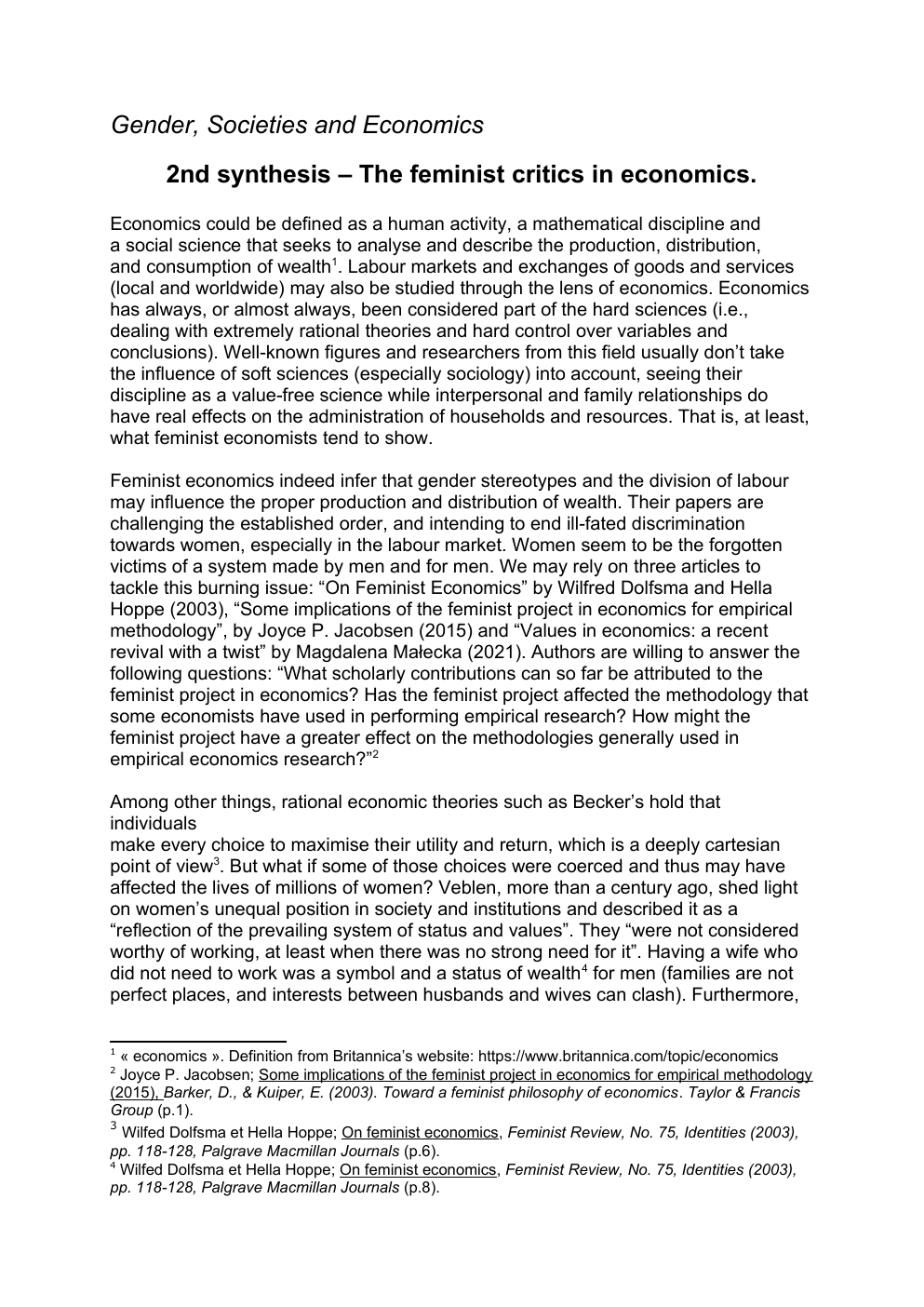The feminist critics in economics
Publié le 28/04/2024
Extrait du document
«
Gender, Societies and Economics
2nd synthesis – The feminist critics in economics.
Economics could be defined as a human activity, a mathematical discipline and
a social science that seeks to analyse and describe the production, distribution,
and consumption of wealth1.
Labour markets and exchanges of goods and services
(local and worldwide) may also be studied through the lens of economics.
Economics
has always, or almost always, been considered part of the hard sciences (i.e.,
dealing with extremely rational theories and hard control over variables and
conclusions).
Well-known figures and researchers from this field usually don’t take
the influence of soft sciences (especially sociology) into account, seeing their
discipline as a value-free science while interpersonal and family relationships do
have real effects on the administration of households and resources.
That is, at least,
what feminist economists tend to show.
Feminist economics indeed infer that gender stereotypes and the division of labour
may influence the proper production and distribution of wealth.
Their papers are
challenging the established order, and intending to end ill-fated discrimination
towards women, especially in the labour market.
Women seem to be the forgotten
victims of a system made by men and for men.
We may rely on three articles to
tackle this burning issue: “On Feminist Economics” by Wilfred Dolfsma and Hella
Hoppe (2003), “Some implications of the feminist project in economics for empirical
methodology”, by Joyce P.
Jacobsen (2015) and “Values in economics: a recent
revival with a twist” by Magdalena Małecka (2021).
Authors are willing to answer the
following questions: “What scholarly contributions can so far be attributed to the
feminist project in economics? Has the feminist project affected the methodology that
some economists have used in performing empirical research? How might the
feminist project have a greater effect on the methodologies generally used in
empirical economics research?”2
Among other things, rational economic theories such as Becker’s hold that
individuals
make every choice to maximise their utility and return, which is a deeply cartesian
point of view3.
But what if some of those choices were coerced and thus may have
affected the lives of millions of women? Veblen, more than a century ago, shed light
on women’s unequal position in society and institutions and described it as a
“reflection of the prevailing system of status and values”.
They “were not considered
worthy of working, at least when there was no strong need for it”.
Having a wife who
did not need to work was a symbol and a status of wealth 4 for men (families are not
perfect places, and interests between husbands and wives can clash).
Furthermore,
1
« economics ».
Definition from Britannica’s website: https://www.britannica.com/topic/economics
Joyce P.
Jacobsen; Some implications of the feminist project in economics for empirical methodology
(2015), Barker, D., & Kuiper, E.
(2003).
Toward a feminist philosophy of economics.
Taylor & Francis
Group (p.1).
3
Wilfed Dolfsma et Hella Hoppe; On feminist economics, Feminist Review, No.
75, Identities (2003),
pp.
118-128, Palgrave Macmillan Journals (p.6).
4
Wilfed Dolfsma et Hella Hoppe; On feminist economics, Feminist Review, No.
75, Identities (2003),
pp.
118-128, Palgrave Macmillan Journals (p.8).
2
this system thus ratified the idea that being a mother is a woman’s most important
duty.
It still has unwanted consequences today.
Women are still generally paid less than men and discriminated against in
employment.
Thus, they encounter more incentives to stay at home to ensure care
and household unpaid labour than men, or to work a part-time contract, when having
young babies to raise.
Even worse, “family structure does turn out to have
measurable effects in many ways one would expect, such as a negative effect of
children on both earnings and hours worked for pay by women”, Jacobsen says 5.
Household unpaid work is not enough considered.
Men are also often gifted a wage
premium when getting married while women are not 6.
Feminine-identified terms,
associated with economics, have a negative connotation, say Hoppe and Dolfsma 7
while discussing Julie Nelson’s gender value compass.
And so do feminine values
and work, discredited on a day-to-day basis.
If women were employed and paid
following the same criteria as men, we can believe that the division of labour would
have been very different.
In brief, rational behaviour in economics is no longer
relevant since the administration of wealth is influenced by power differences and
inequalities are the result of involuntary optimization and differential distributional
effects.
But now that those inequalities are proven, what can be done to get rid of
them?
Maybe....
»
↓↓↓ APERÇU DU DOCUMENT ↓↓↓
Liens utiles
- The 1960’s and the American Woman: the transition from the “housewife” to the feminist
- exposé anglais introduction to the Consumer Society
- Le théâtre a-t-il pour fonction de tout dire, de tout expliquer au spectateur de la crise que vivent les personnages? - Par quels moyens et quelles fonctions Juste la Fin du monde est une pièce qui nous retrace la crise de cette famille?
- Ideology and Rationality in the History of the Life Sciences
- is the cultural difference a barrier between individuals.

































